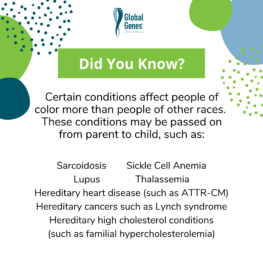Know that your family’s health history can help your doctor take better care of you, even if you are healthy right now. After looking at your family history, your doctor can find out if a disease runs in your family so they can watch for signs or test you and your family members before it becomes a problem…and also start treatment earlier to help you.
Here you will find tips on how to start a conversation with your family, a list of questions to ask, and additional information about why learning about your family health history is important.
Why is your family history important?
Having information about your family health history can help you answer the following questions:
- Do multiple people in your family have similar health problems?
- Are there people in your family who have health problems, but don’t know the cause?
- How are the health issues being passed on (inherited) to others in your family?
- Are there changes you can make that could affect if or when you will develop a health problem? (for example: what you eat or drink, physical activity, or smoking)
- Are the health conditions in your family caused by changes in genes?
- What is the chance you may have a child with this disease?
- What is the chance of me or my family members getting certain health conditions due to your race and background?

How can you talk to your loved ones about your family health history?
Talking to your family members about their health history can be tricky, but making a plan can help! Even though it might be hard, it’s important to try to get as much information as possible. Here are some tips to help guide your conversation:
- Make a plan to speak with different family members (grandparents, parents, aunts, uncles, nieces, nephews, siblings and children).
- Offer different ways for your family members to share the information. This could be one-on-one, at the next family gathering or reunion, or over phone, text, or email.
- Know that not everyone may feel comfortable sharing information about their health issues. Be a good listener and respect their privacy.
- Explain why knowing your family’s health history is important and having a medical issue is not a cause for shame or a dishonor to the family.
- Write down any information you learn. For example:
- What conditions did different family members have? This will help you find out if there are multiple people with similar problems.
- If any of your family members has died, ask for permission to write down the age they passed, the cause of their death, and any diseases they had.
- Ask about problems during pregnancy or birth, or not being able to have children.
- Ask other family members to help you talk to your family.
Examples of some questions you may ask are:
- Do you know of any health issues that run in your family?
- Do you know if any of your family members have some symptoms and the doctors cannot find what is causing those symptoms?
- Do you know if there have been multiple miscarriages in your family?
Once you have talked to your family and gotten information about what conditions run in your family, you are now ready to share this information with your doctor and they can advise you on what you should do next. You can also contact Global Genes Patient Services (https://globalgenes.org/rare-concierge/) for additional resources.
What to do if you cannot figure out your family history
Sometimes, it is not possible to get a full family history – you may have some information, or none at all. If this is the case, it is important to:
- Tell your doctor that you do not know what health issues run in your family.
- Try to have a healthy lifestyle by staying active, not smoking, and eating and drinking healthy to reduce your own health risks.
- Talk to your doctor about general health tests that you can take.
- Ask your doctor or a genetic counselor about genetic testing.
- Share your health information with your children and other family members so that future generations can benefit.
Read more about tests that can help you find answers, and explain why certain health issues may run in your family.
Learn more about how genetic counselors, a personal guide for you, can help you answer questions, explain hard information, and help you find ways to pay for tests.

Stay Connected
Sign up for updates straight to your inbox.
